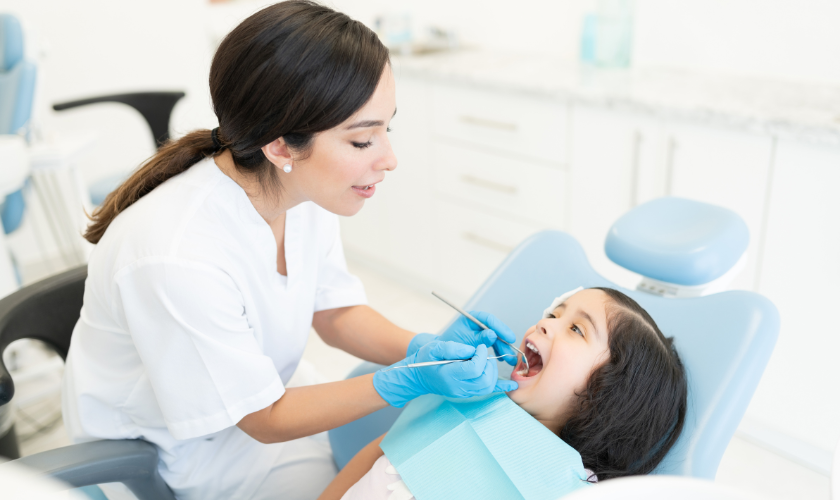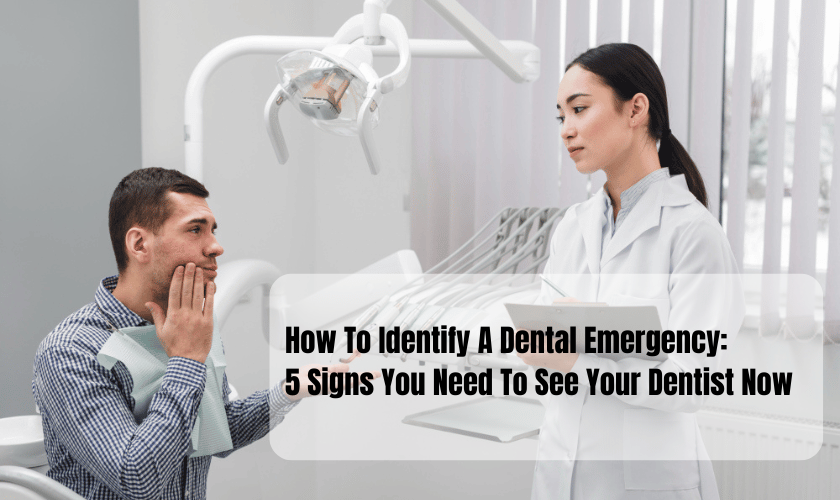Dental emergencies can happen at any time and often require immediate attention. Whether it’s a sudden toothache, a knocked-out tooth, or a broken dental restoration, knowing what steps to take before heading to the emergency dentist can make all the difference in saving your smile. In this article, we will discuss the signs that indicate you need an emergency dentist, as well as helpful tips for finding one. So let’s dive right in and learn how to handle dental emergencies like a pro!
Signs That You Need an Emergency Dentist
When it comes to dental emergencies, it’s crucial to know the signs that indicate you need immediate attention from an emergency dentist. Ignoring these signs can lead to further complications and potentially more pain.
One of the most obvious signs is severe toothache or persistent dental pain. This could be a sign of an infection or abscess, which requires prompt treatment. Another red flag is swelling in your gums, face, or jaw. Swelling can indicate an underlying issue such as gum disease or a dental abscess.
If you experience sudden and intense sensitivity to hot or cold temperatures, it could be a sign of nerve damage or decay that needs urgent attention. Similarly, if you notice any loose teeth or have had a tooth knocked out due to trauma, seeking immediate dental care is crucial for potential reattachment.
Other signs include bleeding gums that won’t stop after applying pressure for several minutes and visible cracks in your teeth following an accident. Additionally, experiencing constant bad breath despite proper oral hygiene may signal gum disease.
Remember, these are just some common signs that warrant immediate action from an emergency dentist. It’s always best to err on the side of caution when it comes to oral health issues!
Steps to Take Before Going to the Emergency Dentist
When faced with a dental emergency, it’s important to stay calm and take immediate action. Here are some steps you can take before heading to the emergency dentist:
Assessing the Severity of the Situation: Start by evaluating how severe your dental issue is. Is it causing unbearable pain or bleeding? If so, it may require immediate attention. If the pain is manageable and there is no excessive bleeding, you might be able to wait until regular office hours.
Trying Home Remedies: While waiting for your appointment, there are some home remedies you can try to alleviate discomfort. Rinse your mouth with warm saltwater to reduce inflammation and kill bacteria. Applying a cold compress on swollen areas can also provide temporary relief.
Contacting Your Regular Dentist: Reach out to your regular dentist as soon as possible. They may be able to fit you in for an emergency appointment or provide guidance over the phone on how to manage your situation until you can see them.
Remember, every dental emergency is unique, and these steps may vary depending on your personal circumstances. It’s always best to consult with a professional before attempting any self-treatment measures.
By taking quick action and following these preliminary steps, you’ll be better prepared when visiting an emergency dentist who specializes in providing prompt care for urgent dental issues.
A. Assessing the Severity of the Situation
When faced with a dental emergency, it’s important to quickly assess the severity of the situation. This will help you determine whether immediate attention is needed from an emergency dentist or if other steps can be taken first.
First and foremost, take a moment to evaluate your level of pain. Is it mild discomfort or excruciating agony? Severe pain that interferes with daily activities may indicate a more urgent need for professional care.
Next, consider any visible signs of trauma or injury to your teeth or mouth. Are there broken teeth, dislodged fillings, or excessive bleeding? These are clear indicators that prompt dental attention is required.
Additionally, pay attention to any swelling or inflammation in your gums or jawline. Swelling could suggest an infection or abscess that requires immediate treatment.
Another aspect to consider is the functionality of your mouth. Can you eat and speak without difficulty? If simple tasks become challenging due to oral discomfort, seeking immediate dental care would be advisable.
Trust your instincts. If something just feels off about your oral health situation – even if there aren’t obvious signs – don’t hesitate to seek professional advice from an emergency dentist.
Remember, assessing the severity of a dental emergency allows you to make informed decisions about seeking immediate treatment from an Emergency Dentist in Elgin
B. Trying Home Remedies
When faced with a dental emergency, it’s essential to take immediate action to alleviate your discomfort. While waiting for your appointment with an emergency dentist, there are a few home remedies you can try to manage the situation.
One common issue is toothache caused by dental decay or infection. Rinse your mouth with warm saltwater as this can help reduce swelling and provide temporary relief. Applying a cold compress on the affected area may also help numb the pain.
For a knocked-out tooth, handle it carefully by holding it by the crown and rinse off any dirt or debris gently without scrubbing. Try placing the tooth back into its socket if possible but avoid forcing it in place. If reinserting isn’t feasible, keep the tooth moist by placing it in milk or water until you reach the emergency dentist.
In cases of broken or chipped teeth, save any broken pieces that you find and rinse them clean. You can use dental wax or sugarless gum to cover any sharp edges temporarily.
It’s important to note that these home remedies only provide temporary relief while waiting for professional care from an emergency dentist.
C. Contacting Your Regular Dentist
When faced with a dental emergency, one of the important steps to take before going to an emergency dentist is contacting your regular dentist. Your regular dentist knows your oral health history and can provide valuable guidance in times of crisis.
First and foremost, give your regular dentist’s office a call. Explain the situation clearly and provide as much detail as possible about the issue you’re facing. They may be able to offer immediate advice or instructions on how to handle the situation until you can be seen by a professional.
In some cases, your regular dentist may have emergency appointments available or be able to refer you to another trusted practitioner who can address your needs promptly. Having this connection with your regular dentist ensures continuity of care and reduces any unnecessary stress during emergencies.
Additionally, reaching out to your regular dentist allows them to stay updated on any changes in your oral health and make necessary adjustments for future treatments or preventive measures.
Remember, it’s always essential to follow proper dental hygiene practices even after seeking emergency care. Regular check-ups with your chosen Elgin Dentist will help prevent future dental emergencies while ensuring optimal oral health overall.
What to Expect at an Emergency Dental Visit
When you find yourself in a dental emergency, it’s important to know what to expect when visiting an emergency dentist. The first thing you should know is that they are specially trained to handle urgent dental issues and provide immediate relief.
Upon arriving at the dental clinic, the staff will assess your situation and prioritize your case based on its severity. If you’re experiencing severe pain or have significant swelling or bleeding, you will likely be seen right away.
During the examination, the dentist will carefully evaluate your condition and may take X-rays to get a better understanding of what’s happening inside your mouth. This thorough assessment helps them determine the best course of action for treatment.
Once the dentist has diagnosed your issue, they will explain their findings and discuss all available treatment options with you. They’ll also address any concerns or questions you may have before proceeding with the necessary procedures.
Depending on the nature of your emergency, treatment could involve anything from simple procedures like tooth extractions or fillings to more complex treatments such as root canals or gum disease management. Rest assured that these professionals are equipped with state-of-the-art technology and techniques to ensure effective results.
After completing the required treatment, the dentist will provide detailed instructions for post-treatment care. It’s essential to follow these guidelines carefully to promote healing and prevent further complications.
In some cases, additional appointments might be scheduled for follow-up visits or ongoing treatments if needed. The team at an emergency dental clinic is dedicated to ensuring that patients receive comprehensive care even after their initial visit.
Remember that every emergency dental visit is unique because each patient’s circumstances vary. However, by knowing what generally happens during these visits, it can help alleviate some anxiety about seeking urgent dental care when needed.
Tips for Finding an Emergency Dentist
1. Research local dental clinics: Start by researching dental clinics in your area that provide emergency services. Look for reputable dentists who have experience handling urgent cases.
2. Ask for recommendations: Reach out to friends, family, or colleagues who may have had a dental emergency before. They can provide valuable insights and recommend reliable emergency dentists.
3. Check online reviews: Read online reviews and testimonials from previous patients to get an idea of the quality of care provided by different emergency dentists. This will help you narrow down your options.
4. Accessibility: When choosing an emergency dentist, consider their location and office hours. It’s important to find a dentist who is conveniently located and available during the times when emergencies are most likely to occur.
5. Credentials and expertise: Ensure that the dentist you choose has the necessary qualifications and expertise in handling dental emergencies. Look for certifications or additional training in emergency dentistry.
6. Insurance coverage: If you have dental insurance, check if the emergency dentist is covered under your plan to minimize out-of-pocket expenses.
7. Flexible payment options : Inquire about flexible payment plans or financing options offered by the clinic so that unexpected expenses don’t deter you from seeking immediate treatment
Remember, finding a reliable emergency dentist beforehand can save time when faced with a dental crisis! Keep their contact information handy for quick access during emergencies.
Preventing Future Dental Emergencies
Taking steps to prevent dental emergencies is essential for maintaining good oral health and avoiding unnecessary pain and discomfort. Here are some tips to help you prevent future dental emergencies:
1. Maintain a consistent oral hygiene routine: Brush your teeth at least twice a day with fluoride toothpaste and floss daily. This will help remove plaque buildup, which can lead to tooth decay and gum disease.
2. Visit your dentist regularly: Schedule regular check-ups with your dentist every six months or as recommended by your dental professional. These visits allow the dentist to identify any potential issues before they become emergencies.
3. Wear protective gear during sports: If you participate in contact sports or activities that pose a risk of facial injury, wear a mouthguard or other protective gear to minimize the chance of dental trauma.
4. Avoid using teeth as tools: Your teeth are meant for biting and chewing food, not opening packages or tearing off tags. Using your teeth as tools can lead to cracks, chips, or even fractures.
5. Be mindful of what you eat and drink: Limit sugary foods and beverages that can contribute to cavities. Additionally, avoid hard candies, ice cubes, popcorn kernels, or other hard objects that could potentially chip or break your teeth.
By following these preventative measures, you can reduce the likelihood of experiencing a dental emergency in the future and maintain optimal oral health!
In times of dental emergencies, knowing what steps to take before going to an emergency dentist can make a significant difference in your oral health and overall well-being. By assessing the severity of the situation, trying home remedies, and contacting your regular dentist, you can ensure that you receive prompt and appropriate care.
When visiting an emergency dentist, it’s important to remember that they are trained professionals who will assess your condition thoroughly. They may perform diagnostic tests, provide immediate treatment or pain relief, and give you instructions for follow-up care.
Finding an emergency dentist doesn’t have to be a daunting task. Start by asking for recommendations from friends or family members. Additionally, search online directories or contact local dental associations for referrals.
Preventing future dental emergencies should also be a priority. Maintain good oral hygiene habits such as brushing twice daily with fluoride toothpaste and flossing regularly. Avoid chewing on hard objects like ice or popcorn kernels and wear protective mouthguard during sports activities.
Remember that while these tips can help in managing dental emergencies temporarily, seeking professional assistance is crucial for proper diagnosis and treatment.
So don’t panic if you find yourself facing a dental crisis – stay calm, take immediate action based on the severity of the situation at hand, and reach out to a trusted emergency dentist in Elgin if necessary. Your smile deserves timely attention!




